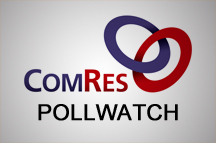UKIP, like a hot air balloon, rose in the polls over the course of this last Parliament thanks in no small part to the hot air of the news media blowing hard into the canopy. We were presented with a new, different political party and voters, desperate for an alternative, took notice.
There was a time when it was hard to turn on the news without seeing Nigel Farage holding a cigarette in one hand and a pint in the other, or open a paper and read about the latest UKIP member / councillor / candidate making some eye-catching comment or other. Whether the headlines were good or bad didn’t seem to matter. UKIP were surging in the polls, growing in support, performing well in by-elections. And, of course, they won the Euro elections with an unprecedented result which saw a party with zero MPs win more votes than anyone else.
Some enthusiastic supporters spoke of winning double-digit MPs at the Party’s peak. Those estimates have now been revised downwards. It now seems that UKIP reached maximum pressure at around the time of Douglas Carswell’s defection but the Party has been slowly deflating since the back end of 2014. They now average around 12% in ComRes polls, down from a high of 18%.
But at this General Election, more so perhaps than any other, the national picture only tells us so much. There is a possibility that UKIP could win significantly more votes than the Liberal Democrats but end up being able to count their MPs on the fingers of one hand, while Liberal Democrat counters would need around five or six hands to keep a tally on their side.
To explore UKIP’s progress in more detail ComRes has polled 10 key UKIP target seats currently held by the Conservatives for ITV News.
 Think of this poll as a looking glass, bringing UKIP’s support into sharper focus. Whatever is going on nationally tells us the general picture, but these seats are the key targets for UKIP. Human and financial resources are being poured into these seats more than others. If they are realistically looking to pick up new seats it will most likely be in these areas.
Think of this poll as a looking glass, bringing UKIP’s support into sharper focus. Whatever is going on nationally tells us the general picture, but these seats are the key targets for UKIP. Human and financial resources are being poured into these seats more than others. If they are realistically looking to pick up new seats it will most likely be in these areas.
Our glance through the looking glass reveals UKIP trailing in third place behind Labour, with the Conservatives set to retain most of these seats.
Nigel Farage will be disappointed that while his party has made significant headway, increasing vote share across these seats by almost 15 points since the 2010 General Election, it is not yet the main challenger to the Conservatives across all seats. Perhaps this is a sign of being overstretched?
What is interesting is how well Labour’s vote share is holding up in these seats which are largely in the South East and East of England. They, and the Conservatives, have been bolstered by the Liberal Democrat collapse and it is one of the key reasons for UKIP’s failure to make first or second place. One in four (25%) of 2010 Lib Dem voters say they will now vote Labour, and 21% say they will now vote Conservative. Only 8% of 2010 Liberal Democrat voters now say that they will vote UKIP.
UKIP will, of course, do better in some of these seats than others, perhaps significantly so. Indeed Nigel Farage has a good chance of winning in South Thanet and Tim Aker is a strong contender in Thurrock. But Mark Reckless far from being a dead cert to hold on in Rochester and Strood.
What UKIP have struggled with is expectations management. Coming from 3.1% in 2010 to anywhere close to even 10-12% is a phenomenal achievement. But the fact that there is now talk of a decline for UKIP shows the heights they had scaled. Worse still, the first-past-the-post electoral system makes their true position look worse than it is because where 12% would deliver a minibus-full of Liberal Democrat MPs, Kippers in Parliament could fit into a mini.
UKIP’s future is difficult to chart. As well as winning seats in May, and don’t forget the local elections taking place in England on the same day, UKIP will be aiming to build a solid base of support for future elections. Coming second in a large number of seats is arguably more important for them in the long term than the difference between winning two or three MPs. If 2015 is not to be UKIP’s high water mark they need to recruit more foot-soldiers to the People’s Army and the best way of doing that is to show they are a competitive force.
But what happens to UKIP post-May 2015? Nigel Farage is a huge attraction to Kippers, and if their talisman steps down having not won his own constituency battle then UKIP’s popularity will inevitably suffer. That said, there are some potentially appealing alternatives waiting in the wings, not least Deputy Chairman Suzanne Evans and Deputy Leader Paul Nuttall (who was the councillor's choice to succeed Mr Farage in a recent ComRes poll for the BBC's Sunday Politics).
If the Conservatives are ejected from Downing Street come May, that could also spell trouble for UKIP. Not only because Boris may well succeed as leader and is there really space for Boris and Nigel in British politics? But is there space on the right of British politics for two main parties of opposition? Will there be enough puff left to re-inflate the canopy to keep UKIP airborne?
Author:
Tom Mludzinski
Head of Political Polling
More information:
To sign up to receive the ComRes Pollwatch via email please visit their website.














